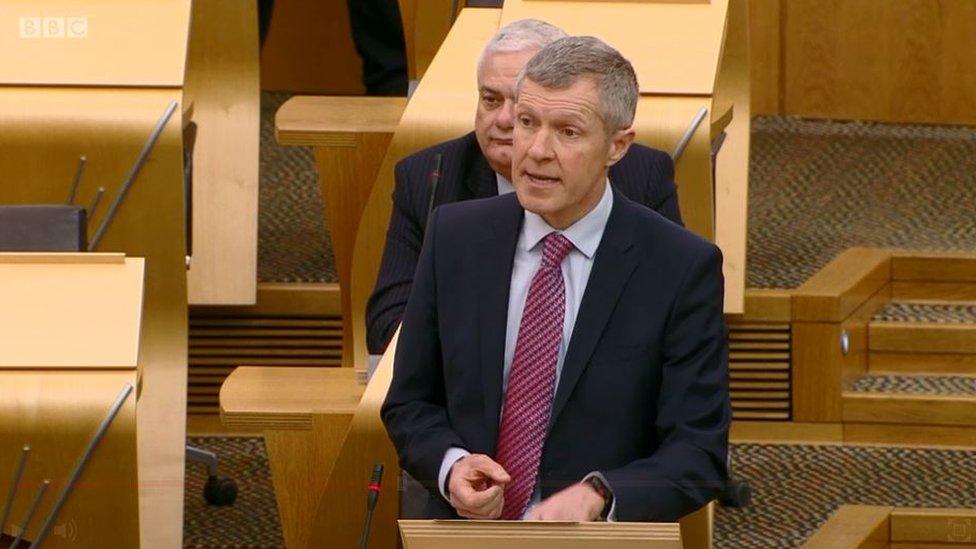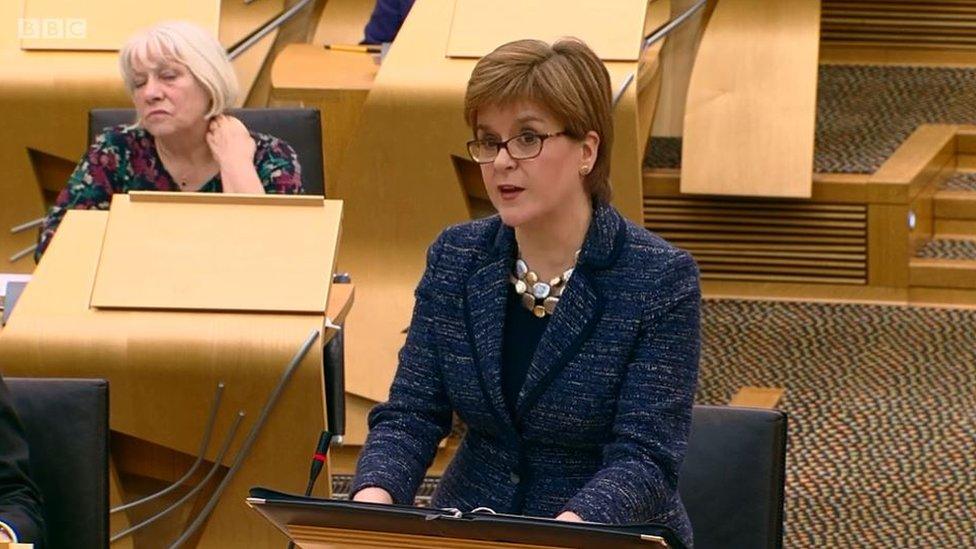Willie Rennie's charm offensive
- Published

Politicians all too rarely receive compliments. In these troubled times, they have had to become inured to the biting wound of insult rather than the soothing swab of flattery.
But today brought an exception. Willie Rennie, he who leads the Liberal Democrats, was described at Holyrood as charming.
OK, he used the epithet about himself. For some pedants, that might slightly weaken the impact. But I say you have to take solace where you can find it, during this Brexit hiatus.
Mr Rennie claimed that it was his charm which had won the first minister round to the cause of supporting a further referendum on the EU - or a "People's Vote", the title preferred by the plan's advocates.
Nicola Sturgeon rose wearily, looking about as charmed as a particularly grumpy snake whose veteran handler has plainly lost that once-renowned mesmeric skill.
She advised Willie Rennie, in sum, to stick to the day job and leave the boyish chit-chat to others. Still, they contrived to find a joint perspective.
Both agreed that the issue of Brexit should return to the people, perhaps by pitting the option of remaining in the EU against the prime minister's deal (or its variant version, once Jeremy Corbyn has had a quiet word).
And they agreed that there was a hazard that any agreement between Labour and Theresa May might be picked apart later, by her successor as prime minister.
That she was, in short, simply seeking a conduit for endorsing her (unchanged) Withdrawal Agreement - in return for promises on future arrangements which might fall to be implemented by a different PM, once she had gone off walking in the Welsh hills.

Both Mr Rennie and Ms Sturgeon named names. Or, rather, name. Both suggested that the successor PM might be Boris Johnson.
Indeed, Ms Sturgeon uttered the name of the MP for Uxbridge and South Ruislip in much the same tone as a court-room clerk summoning the next witness by declaring: "Call Lucifer, also known as Beelzebub."
But, if uncharmed, Ms Sturgeon found common ground with Mr Rennie. There was co-operation elsewhere too.
Labour's Richard Leonard sounded notably emollient as he lauded the talks between the PM and Mr Corbyn, while urging the FM to join him in condemning the lingering prospect of a no deal Brexit.
Wicked cynics (yes, there are a few of them at Holyrood) suggested later that the Labour leader wanted to appear open to co-operation with Ms Sturgeon for fear of his party seeming unilaterally close to the Tories.
I tend to discount that. Whatever, this was well handled by Mr Leonard. He raised the spectre of no deal, promised his party's best endeavours to pre-empt it, then addressed Brexit issues directly germane to the FM and Holyrood, such as the provision of medicines and the impact on public finances.
In any event, Ms Sturgeon's fire was aimed elsewhere. She said the Tories should "hang their heads in shame" at the crisis they were inflicting on the populace. A glance in the direction of the Tory benches elicited no such physical response.
Jackson Carlaw, for the Conservatives, found an excellent way of coping with Brexit. He ignored it altogether.
To be fair, the issue he raised - pupil attainment and the range of subjects on offer - was decidedly serious, pertinent and topical.
And Mr Carlaw might reasonably argue that Brexit requires fewer political questions and more practical answers. However, when pursued by the wicked media later (OK, it was us), he stressed that he would take no lessons from a party, the SNP, which had contributed to the problem by thwarting the PM's deal.